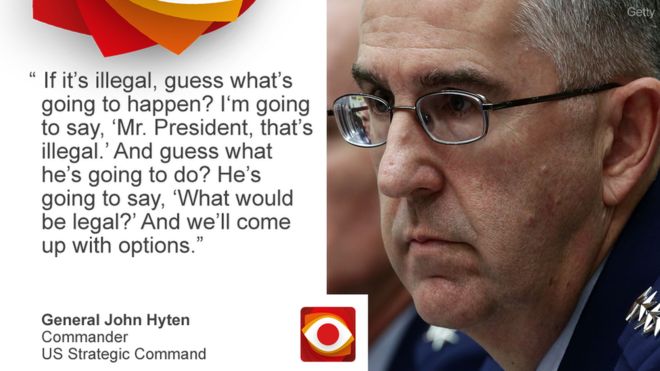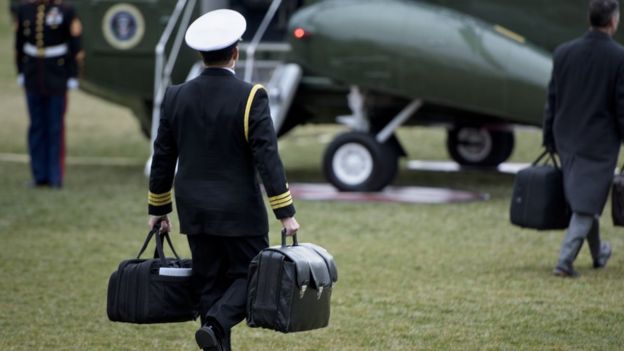The case: US military work force could oppose President Trump on the off chance that he requested an unlawful atomic strike.
Rude awakening decision: Although regularly no one is permitted to decline the president's request, by and by, officers would expect a decent clarification for the strike - and would be obliged to state "no" to an unlawful request.
As of late, with pressures ascending between the US and North Korea, individuals have been requesting that what's stop President Trump propelling atomic weapons.
A resigned general revealed to Congress that the military might have the capacity to state "no" to the President, in specific situations.
Presently, Gen John Hyten, who drives US Strategic Command, has told the Halifax International Security Forum that he would exhort against a strike on the off chance that he thought of it as was illicit.
Be that as it may, would anyone say anyone is permitted to state "no" to the president on the off chance that he arranges an atomic strike?
Access codes
On the off chance that President Trump needed to discharge atomic weapons, he could first talk about a scope of choices with his counsels.
He'd then issue a request to top military authorities at the Pentagon.
They would affirm the president's character by trading codes imprinted on a card called the "scone", which the president conveys wherever he goes.
The request would go to US Strategic Command, which would then send advance guidelines and access codes to groups on the ground (or, maybe, submerged in a submarine.)
Those teams would then dispatch the rockets.
The BBC's Inquiry podcast secured the items of common sense of propelling an atomic strike in substantially more detail.
Is there anybody, at any of those stages, who'd be permitted to state "no" to the president?
Levels of leadership
A preparation from the Congressional Research Service influences the legitimate circumstance to plain. "The US president has sole specialist to approve the utilization of US atomic weapons."
Normally, no one is permitted to over-administer the president's choice - it's a piece of his part as Commander-in-Chief.
In principle, the VP could remove the president if a larger part of the bureau concurred that the president was unfit to serve.
By and by, that would be hard to arrange so as to stop the president propelling atomic weapons.
Yet, Peter Feaver, educator of political science at Duke University in North Carolina, says it's not genuine that President Trump could dispatch an atomic strike as effectively as he could shoot a tweet.
"The president is giving a request which is transmitted down a hierarchy of leadership. Somebody additionally down that levels of leadership turns the key or presses the catch."
Military officer conveys two satchels to a military flying machine on the White House lawn.Image copyrightAFP
Picture subtitle
Inside this satchel, the atomic codes. To utilize them, the president would need to talk with the Pentagon.
Prof Feaver says that if the president went to the military to arrange a strike, this would trigger a "discussion process" - commanders needing to recognize what the president was attempting to accomplish, why the president needed to utilize atomic weapons et cetera.
President Trump would have the lawful specialist to arrange the strike all the same, against any exhortation he gets.
In any case, regardless he'd have to influence the military to do that request.
Legitimate requests
Gen Hyten contended that if an atomic request was unlawful, he wouldn't complete it.
"On the off chance that you execute an unlawful request, you will go to imprison. You could go to imprison for whatever remains of your life."
What might make an atomic request unlawful?
Some contend that all employments of atomic weapons would be unlawful.
Be that as it may, regardless of whether you question that, there might be sure conditions where it is illicit to shoot atomic weapons.
Anthony Colangelo, teacher of law at the Southern Methodist University in Dallas, contends that specific sorts of atomic strikes could infringe upon global compassionate law.
Universal helpful law oversees how nations must carry on when at war. It originates from arrangements the US has marked, for example, the Geneva Conventions, yet additionally from custom and case law, as well.
You may overstep the law by utilizing atomic weapons when traditional weapons could accomplish a similar target or by utilizing atomic weapons some place where they would slaughter soldiers and regular citizens aimlessly.
High contrast photo from 1945 demonstrating the remains of Nagasaki after the nuclear bomb was dropped.Image copyrightGETTY IMAGES
Picture subtitle
The assaults on Nagasaki and Hiroshima in 1945 are the main points of reference for the human destruction caused by utilizing atomic weapons.
This isn't simply Prof Colangelo's supposition. The US Department of Defense recognizes in its law manual that "the law of war represents the utilization of atomic weapons".
Prof Colangelo says the obligation to comply with the law "keeps running starting from the top - directly down to the group part on the submarine".
In the event that the president arranges an unlawful strike, any individual who completes that request is possibly obligated for atrocities.
They'd have an obligation to state "no".
Would officers rebel?
Not every person is similarly ready to detect an unlawful request, however.
The submarine teams, for instance, won't approach all the data that the president and his best military authorities do. They won't not be in a position to tell whether a request is legitimate.
Furthermore, Prof Colangelo calls attention to it won't not be something worth being thankful for to urge those team individuals to scrutinize any request that comes their direction. "The whole structure of military charge would disintegrate if subordinates began second-speculating orders."
Gen John Hyten and other military figures address a Congressional hearing in March 2017.Image copyrightGETTY IMAGES
Picture inscription
Gen John Hyten has said he would decline to complete an illicit request.
On the off chance that a general said "no" to the president, he could obviously fire that general. Be that as it may, their substitution would be similarly obliged to comply with the law.




No comments:
Post a Comment